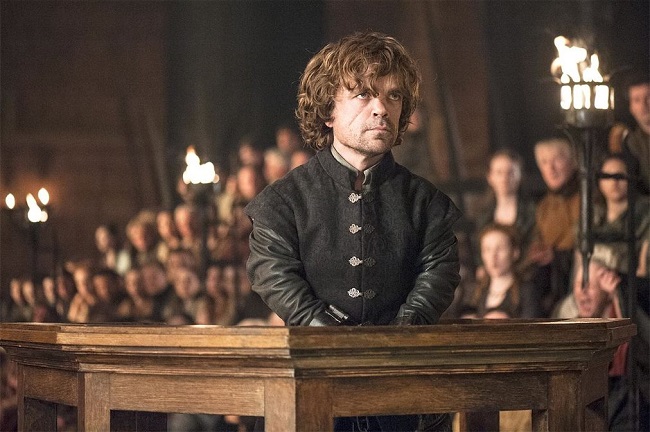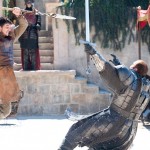
Game of Thrones has gotten into the habit this season of spending the first half or so of each episode checking in on various characters and plotlines before honing in on a single event or story thread to which it devotes a large portion of its second half. Joffrey's wedding and the attack on the mutineers at Craster's Keep were both given such preferential treatment, and now "The Laws of God and Men" puts Tyrion's trial front and center for a large chunk at the end of its hour. And if you guessed that seeing Tyrion be forced to take the stand might make for an entertaining extended segment … well, you'd be right and then some.
Joffrey's murder provided shock value and a death we all prayed would someday come, but Tyrion's trial — held in the King's Landing Throne room with Tywin sitting in the Iron Throne — proves to be this season's most energized sequence thus far. It begins with witnesses being called in to testify, during which every snarky comment and half-hearted threat that Tyrion has made to and about his family during the show's run comes back to bite him in the ass. By the second witness, he looks like a man who has long yearned to off Joffrey. Sensing a dark inevitability, Jaime approaches his father during a recess and offers a deal — he'll leave the Kingsguard and return to Casterly Rock, where he'll get married, have children and ensure the future of the Lannister family name, provided Tyrion is granted mercy and sent off to the Knight's Watch after a guilty verdict.
Tywin's answer comes surprisingly quickly. "Done" he declares, agreeing to Jaime's terms, which prompts a double-take from both the Kingslayer and everyone watching at home. We get so caught up on Tywin serving as one of the show's "villains" that it's easy to forget that he's usually not presented as cartoonishly evil and can even be quite reasonable, so long as he's able to further his own political and personal agendas. Tywin is calculating, not emotionally vindictive like Cersei. All Tyrion has to do is ask for mercy once the verdict comes, which he appears more than willing to do … until the trial and resumed and Shae is brought in as a surprise witness to testify against him. Whether it's because she's full of resentment for Tyrion casting her off or because the Lannisters got to her and threatened a horrible fate (or some combination of the two), Shae takes the stand and tells a convincing tale of her dwarf lover who meticulously crafted a plan with his wife, Sansa Stark, to kill the king.
The betrayal causes Tyrion to snap. No longer will he play by the rules he's been forced to adhere to his whole life. No longer will he allow others to determine his fate just because he's the young one, the short one, the one Tywin never really cared about. Everything that's been building up inside Tyrion since the series' started comes spilling out, and Dinklage shows why he's been Game of Thrones' greatest asset since day one. "I did not kill Joffrey," Tyrion snarls, "but I wish that I had. Watching your vicious bastard die gave me more relief than a thousand lying whores! I wish I had enough poison for the whole pack of you. I would gladly give my life to watch you all swallow it."
And then the kicker: "I demand a trial by combat." Cut to black. The whole scene crackles and, moreso than at any other time this season, I can't wait to watch next week's episode. Tyrion has gone through a trial by combat before, with Bronn serving as his champion and proving victorious at the Eyrie way back in season one. It seems unlikely he will have it so easy this time.
Other not-as-good stuff occurs in "The Laws of God and Men." Stannis shows up at the Iron Bank and begs Mycroft Holmes to loan him some gold. It doesn't go over too well, though Davos gives an impassioned speech that could change some minds down the road. The most notable thing about this sequence is that it's our first proper look at Braavos (home to Arya's mysterious shapeshifter assassin friend), which features an impressive giant warrior statue and gets a plum spot in the opening-credits map. Elswhere, Yara Greyjoy attempts a rescue of her brother, but Theon is past the point of even wanting rescued. He's now entirely "Reek" in mind and body. I've come to appreciate Iwan Rheon's wild-eyed turn as Ramsay Snow. He makes for an effectively disturbing villain. If only I gave a damn about the people he was busy terrorizing all the time.
A few more thoughts on "The Laws of God and Men" …
– Oberyn Martell is really growing on me. With Tyrion facing such a dire and uncertain future, Oberyn has become the show's de facto comic relief, refusing to stand (or even take his feet off the table) when Tywin enters the room for a council meeting and showing the most interest in the parts of Tyrion's trial that deal with sex. And the more screen time Oberyn gets, the more charming Pedro Pascal seems to make him.
– Daenerys is busy queening this week. It's pretty boring, although we do get to see how her dragons go about getting their lunch, which is fun.
– No Littlefinger this episode, but Varys gets more screen time than he has in a good long while. Eunuchs represent.











